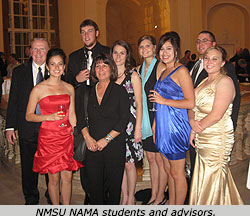The North Central NAMA Chapter set the stage for its spring 2011 meetings with a panel representing the generations in today’s work force. Four professionals representing the age groups: Traditionalists, Baby Boomers, Generation X and Generation Y, shared their perspectives on today’s work place. Syngenta hosted the November meeting at their new state-of-the-art facility. Teri Otte from Land O’Lakes moderated the panel.
Joe Turner, formerly in the publishing industry and now an independent realtor, represented the Traditionalist point of view. These individuals are 70 plus years old and were not touched by computer technology during their professional careers. Turner said he considered the work day to be from 8 a.m. to 5 p.m., and each day he had breakfast and dinner with his family. That work day was influenced by the fact that you caught a train to work in the city and you had to catch that train home in the evening.
Turner shared that he was quick to adopt the technologies, such as faxes and cell phones, but during his professional career those technologies were not available. He used a desk phone, or pay phones when he was out of the office, to make sales calls. Also, there weren’t many women in the workforce.
When asked about the type of relationship he expected between him and a supervisor, Turner said, “A boss is not a buddy.” He expected to be given the parameters of a job and then he did the job. He didn’t have an expectation to be friends with his boss.
That sentiment was echoed by Tim Burke from Martin|Williams. Burke represented the Boomer generation on the panel. This group is 50 plus and some on the upper end are approaching retirement. He said that in his 30s and 40s he rarely used all of his vacation days. There wasn’t an emphasis on work/life balance. However, as he has gotten older, his attitude has changed and he realizes the benefits of taking time off. Technology also made it easier to be more efficient.
Burke said that the adoption of technology among Boomers was quick as it developed. In his early days of advertising, they hand wrote reports, gave them to an assistant to type, proofed the reports, retyped if there were errors and mailed reports to clients. The first computers didn’t come into his workplace until 1986. He said technology such as cell phones, e-mail and improved transportation made it easier to balance work and personal life.
Wendy Clark from Hoards represented the Generation X employee. These workers are in their 30s and 40s. Computers didn’t really become common until high school. Clark said she got her first e-mail account and cell phone in college. Computers were mostly desktop versions and laptops weren’t really common.
Clark said her work day is a traditional 8 a.m. to 5 p.m., but she telecommutes three days a week. She worked in the Hoards office for the first year to truly learn the business and then began telecommuting. Technologies such as a smart phone and laptop make it possible for her to do her job remotely. As a working mom, Clark has to balance her job with the needs of her young family.
When asked about the type of relationship she wanted with her boss, Clark said she would like more feedback from her manager, a more mentor-like relationship. She admitted that with a boss that is a Traditionalist that isn’t necessarily an easy situation, however, they have adjusted to each other’s communication style.
Kayla Irvin from Syngenta was the Generation Y representative on the panel. Irvin has been around computers since kindergarten. Every computer she has owned or worked on is a laptop and cell phones were always in existence.
Irvin said she places a high value on work/life balance. As a full-time employee and also a graduate student, Irvin values working hard, but she isn’t going to wait for retirement to relax. She said she plans to reward herself with an extended vacation once her graduate degree is complete. Irvin views her co-workers and her boss as mentors in developing her professional career. She said a personal relationship with her co-workers and her boss is important.
This panel lays the groundwork for the February, 2011 North Central NAMA meeting when the meeting topic will focus on how to establish strong working relationships across the generations.
 Stay up-to-date on the latest happenings with our Student NAMA Chapters. Visit the latest edition of NAMA On Campus at http://www.nama.org/student/winter11.pdf, for what’s happening with the chapters.
Stay up-to-date on the latest happenings with our Student NAMA Chapters. Visit the latest edition of NAMA On Campus at http://www.nama.org/student/winter11.pdf, for what’s happening with the chapters.

